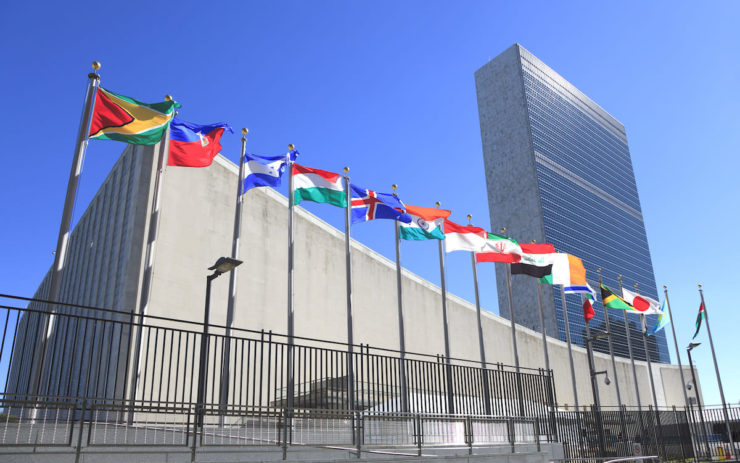
The end of the World War 2 brought significant changes to the world system. Two consecutive world wars in a span of 3 decades perplexed world leaders and political scientists. Fear about the outbreak of a new global war worried all the intellectual minds of the globe, and they attempted to formulate a system that could resolve international conflicts peacefully. The United Nations Organization was established as a successor of the League of Nations, under new rules. Maintaining international security and peace was the key rationale of the United Nations (UN). However, many international events and conflicts have raised serious concerns about the effectiveness of the UN. Liberals and realists have always had conflicting opinions about the success of the organization. Liberals hold that the organization has achieved its agenda of maintaining the security and peace of the world, since no major conflict has risen since its creation in 1945. They provide the peaceful culmination of the Cold War as a substantiation of the United Nations.
Despite the start of a war against non-state actors after the 9/11 incident, the United Nations successfully avoided direct military conflict among states. Moreover, peacekeeping missions, nuclear nonproliferation programs, collective security measures, and economic sanctions have been used by the organization from time to time to maintain global peace. However, realists provide their own reasons for global restraint from any direct major conflict. Arms control and nuclear disarmament have remained a key objective of the United Nations to prevent any threat to global security and peace. The UN played a critical role in eliminating chemical and biological weapons. Nonetheless, it has not been successful in eliminating all sorts of peace-threatening weapons. Biological Weapons Convention (BWC) was passed by the members of the United Nations in 1972 under which various types of weapons of mass destruction were prohibited. This convention effectively outlawed the production, development, transfer, use, and possession of toxin and biological weapons. Furthermore, the Chemical Weapons Convention (CWC) was also adopted by the United Nations in 1993 which prohibited the production, possession, and use of chemical weapons throughout the world.
The United Nations also attempted to avoid the spread of nuclear weapons through the nuclear non-proliferation treaty. It also has peacekeeping missions deployed in several countries. However, for years there has been widespread discontent with the basic structure and successes of the United Nations. There is a widespread belief among the third countries that these organizations merely protect the rights of the powerful nations. The P5 countries, comprising the United States, France, the Russian Federation, the United Kingdom, and China, hold the veto power in the UNO. This enables them to veto any resolution which goes against their interests. The United States has been exercising this power to prevailing its nefarious designs for decades. Most recently, the US used this power to veto resolutions seeking a humanitarian crisis in Gaza. Recurrent use of this power by the United States since October 7 has resulted in the deaths of thousands of innocent civilians, including a huge number of women and children, in Gaza.
The United States acts as the sole power of the world and the torch-bearer of human rights and liberal values around the globe. However, history posits that the US is the biggest violator of liberal values and human rights. It has been disregarding UN resolutions on multiple issues since the latter’s creation. It has been using its veto power to achieve its geostrategic interests around the world. The United Nations seems helpless against the powerful nations. The deaths of thousands of Iraqi people after the US invasion of Iraq is one of the major incidents of its failure to protect innocent people. After criticism from the UN Secretary-General over Israel’s war crimes and genocide in Gaza, the Israeli government shamelessly demanded his resignation. Till now, the United Nations has failed to restore peace or protect the lives of civilians in Gaza.
The Kashmir issue is also one of the major issues of the world. The dispute between the two nuclear powers makes South Asia a hot spot for an imminent nuclear war. The United Nations has passed multiple resolutions asking for peaceful resolution of the issue through plebiscite but has failed to implement these resolutions. The Russia-Ukraine conflict is also one of the failures of the United Nations. The organization failed to bring the two sides to the table and to resolve their issue peacefully. Burgeoning chaos and turmoil in Africa also show the failure of the United Nations. The fundamental structure of the United Nations is the underlying cause of its failures. Restructuring the United Nations and providing equal say to all the member states is imperative to ensure its survival and success. Otherwise, the growing discontent among the non-Western states can result in the creation of an alternative, inclusive international institution. However, this new institution will not be governed by the United States or some other power and will provide equal opportunity to all the members. BRICS appears to be the perfect example of this.
Taut Bataut – is a researcher and writer that publishes on South Asian geopolitics, exclusively for the online magazine “New Eastern Outlook”.